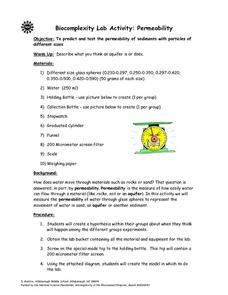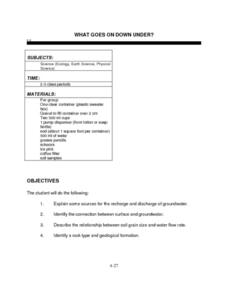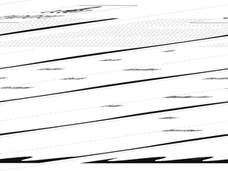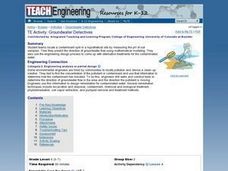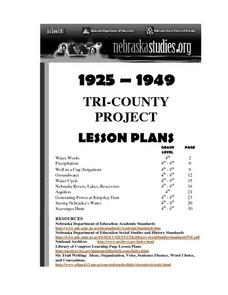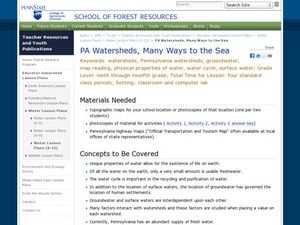Curated OER
Biocomplexity Lab Activity: Permeability
Students identify how water moves through materials such as rocks or sand. Students measure the permeability of water through glass spheres to represent the movement of water in sand, an aquifer, or another sediment. During the...
Curated OER
What Goes On Down Under?
Young scholars explore the sources for recharge and discharge of groundwater. They research the connection between surface water and groundwater. Students construct a model of an aquifer and explore recharge and discharge of the aquifer.
Curated OER
Do You Drink It?
Young scholars explore the aquifer. They create a model of an aquifer and explain how a well works. Students explore the relationship between a well and the water table. They explore the various ways that groundwater becomes contaminated.
Curated OER
Water Filtration
As an example of nature's water filtering system, young ecologists conduct an experiment in the lab. They construct a funnel out of a plastic bottle, fill it with specified layers of materials that simulate layers of soil, then run muddy...
Curated OER
Catch a Wave
Students study low tides and how to calculate for fresh water. In this ocean science lesson, students pretend they are stranded on an island and must calculate low tide in order to source the fresh water aquifer. Students calculate how...
Curated OER
Groundwater as Part of the Water Cycle
Ninth graders study the effects of soil and rocks on filtering groundwater. In this groundwater lesson students complete a lab activity that includes sources of contamination.
Curated OER
What is a Karst?
Learners examine the process that creates limestone. In this limestone lesson students complete a worksheet and participate in a lab activity.
Curated OER
Caverns: Drip Rate Analysis
Students tour a cave and collect water samples. They measure the drip rate from several locations inside the cave and discover the part water plays in cave formation.
Curated OER
How Full is Full?
Students examine porosity and permeability and relate these concepts to groundwater flow. They use simple materials to conduct a porosity experiment and use the information to understand how environmental engineers decide on the...
Curated OER
Water: Naturally Cleaned
Learners use stream trays covered in different types of rocks or soil to investigate infiltrates and runoff. In this water pollution lesson, students work in groups with stream trays that have different substrates. They write a paragraph...
Curated OER
Groundwater Detectives
Learners measure the pH of soil samples from a hypothetical site to locate a contaminant spill and will predict the direction of groundwater flow using mathematical modeling. They use the engineering design process to develop...
Curated OER
Plotting the Petroleum Plume
Eighth graders examine the difference between confining layers and aquifers in a basic water table aquifer scenario. They contour groundwater elevation and petroleum product thickness data.
NASA
The Case of the Wacky Water Cycle
Join the tree house detectives in learning about the processes of the water cycle, water conservation, water treatment, and water as a limited resource.
Curated OER
"Tri-County" Project--Well in a Cup
Students construct a model of a well to identify how water is brought to the surface. Signs of pollution are investigated.
Curated OER
Water: Our Most Important Beverage
Third graders complete a KWL chart on what they already know about water and what they want to know. As a class, they participate in an activity in which they discover the amount of drinkable water on Earth and are introduced to the...
Curated OER
PA Watersheds, Many Ways to the Sea
High schoolers examine the water cycle and the factors that interact with watersheds. In this watersheds instructional activity students describe the purification process, trace the flow of infiltrate water through aquifers, and...
Curated OER
Is Your Water Clean?
Students compare water quality of different sources. They test water samples for odor, phosphates, pH, bacteria, and dissolved solids. they fill out a data table and answer questions about their findings.
Curated OER
Groundwater Flow Demonstration Model
Students investigate the concept of groundwater that includes aquifers, groundwater flow, and the water table. They participate in activities using a flow demonstration model. Its use engages all types of learners because of its hands on...
Curated OER
Porosity
Students investigate the concept of an aquifer and use a 2 liter bottle and other materials to conduct a simple lab experiment or demonstration. They calculate the volume of water that can be stored in the aquifer. The lab is used to...
Curated OER
Underground Pollution
Fourth graders construct their own aquifer. They discover how water travels underwater and identifies sources of underground pollution. They record their observations and discuss the results.
Curated OER
Solubility and Chemical Changes in Groundwater
Students test pH of water before and after it travels through different substrates (igneous pebbles and limestone) to detemine how soluble materials can affect groundwater. They answer questions such as: What happended to the pH of the...
Curated OER
Using Our Natural Resources Wisely
Students understand how ground water can be recycled to maximize its usage and begin to think about ways conservation can help Kansas preserve its natural resources in other areas - soil, minerals, and clean air.
Chymist
Testing the Waters
Should you trust the water you drink every day? The hands-on activity has scholars test water from different sources for contaminants. Pupils perform chemical testing and make conclusions about pH, hardness, iron, chlorine, lead, and...
Curated OER
Dilution and Concentration of Solutions
Future chemists practice laboratory techniques by creating a monochloramine solution. The objectives are to use of dilution, 9concentration, and measurement skills and to prepare a solution that will be used in a water treatment...
Other popular searches
- Aquifer Ground Water
- Aquifer Water Table
- Aquifer Model
- Build an Aquifer
- Florida Aquifer
- Ogallala Aquifer
- Model of an Aquifer
- Aquifer Lesson
- Aglaia Aquifer
- Karst Aquifers
- Southwest Asia Aquifers
- Karts Aquifers


